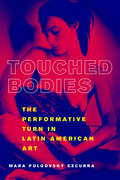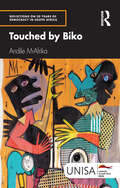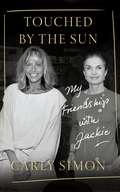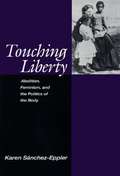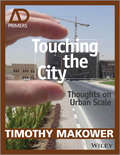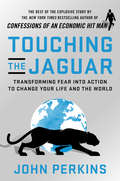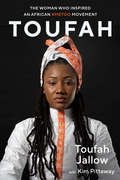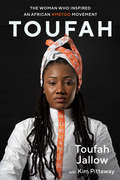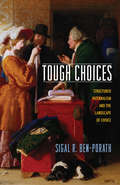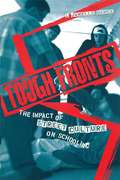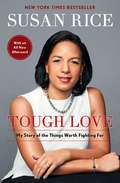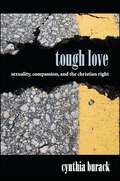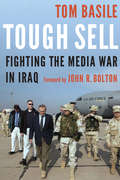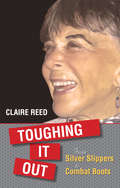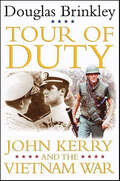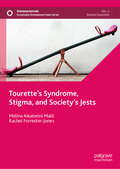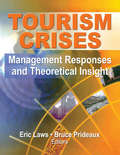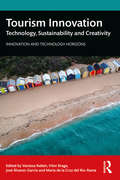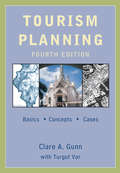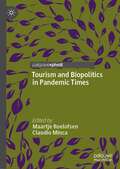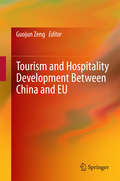- Table View
- List View
Touched Bodies: The Performative Turn in Latin American Art
by Mara Polgovsky EzcurraWhat is the role of pleasure and pain in the politics of art? In Touched Bodies, Mara Polgovsky Ezcurra approaches this question as she examines the flourishing of live and intermedial performance in Latin America during times of authoritarianism and its significance during transitions to democracy. Based on original documents and innovative readings, her book brings politics and ethics to the discussion of artistic developments during the “long 1980s”. She describes the rise of performance art in the context of feminism, HIV-activism, and human right movements, taking a close look at the work of Diamela Eltit and Raúl Zurita from Chile, León Ferrari and Liliana Maresca from Argentina, and Marcos Kurtycz, the No Grupo art collective, and Proceso Pentágono from Mexico. The comparative study of the work of these artists attests to a performative turn in Latin American art during the 1980s that, like photography and film before, recast the artistic field as a whole, changing the ways in which we perceive art and understand its role in society.
Touched by Biko (30 Years of Democracy in South Africa)
by Andile M-AfrikaIn Touched by Biko, Andile M-Afrika writes about his memories of Ginsberg, the black township across the Buffalo River from central King William’s Town which was also home to Steve Bantu Biko. The book has been developed from his MA Creative Writing thesis, which he completed at Rhodes University in 2013.Print editions not for sale in Sub-Saharan Africa. This book is part of Routledge’s co-published series 30 Years of Democracy in South Africa, in collaboration with UNISA Press, which reflects on the past years of a democratic South Africa and assesses the future opportunities and challenges.
Touched by the Sun: My Friendship with Jackie
by Carly SimonA chance encounter at a summer party on Martha's Vineyard blossomed into an improbable but enduring friendship. Carly Simon and Jacqueline Kennedy Onassis made an unlikely pair - Carly, a free and artistic spirit still reeling from her recent divorce, searching for meaning, new love, and an anchor; and Jackie, one of the most celebrated, meticulous, unknowable women in American history. Nonetheless, over the next decade their lives merged in inextricable and complex ways, and they forged a connection deeper than either could ever have foreseen. The time they spent together - lingering lunches and creative collaborations, nights out on the town and mundane movie dates - brought a welcome lightness and comfort to their days, but their conversations often veered into more profound territory as they helped each other navigate the shifting waters of life lived, publicly, in the wake of great love and great loss.An intimate, vulnerable, and insightful portrait of the bond that grew between two iconic and starkly different American women, Carly Simon's Touched by the Sun is a chronicle, in loving detail, of the late friendship she and Jackie shared. It is a meditation on the ways someone can unexpectedly enter our lives and change its course, as well as a celebration of kinship in all its many forms.
Touching Liberty: Abolition, Feminism, and the Politics of the Body
by Karen Sánchez-EpplerIn this study of the pre-Civil War literary imagination, Karen Sánchez-Eppler charts how bodily difference came to be recognized as a central problem for both political and literary expression. Her readings of sentimental anti-slavery fiction, slave narratives, and the lyric poetry of Walt Whitman and Emily Dickinson demonstrate how these texts participated in producing a new model of personhood converged with the sexually distinct and domestically circumscribed female body.
Touching the City: Thoughts on Urban Scale (Architectural Design Primer)
by Timothy MakowerScale in cities is relative and absolute. It has the ability to make us feel at home in the world or alien from it; connected or disconnected. Both large and small scale in cities can be beautiful; both are right, neither is wrong. Whilst accepting that prescription is no answer, 'getting the scale right' – at an intuitive and sensual level – is a fundamental part of the magic of architecture and urban design. Touching the City explores how scale is manifested in cities, exploring scale in buildings, in the space between them and in their details. It asks how scale makes a difference. Travelling from Detroit to Chandigarh, via New York, London, Paris, Rome and Doha, Tim Makower explores cities with the analytical eye of a designer and with the experiential eye of the urban dweller. Looking at historic cities, he asks what is good about them: what can we learn from the old to inform the new? The book zooms in from the macro scale of surfing Google Earth to micro moments such as finding fossils in a weathered wall. It examines the dynamics and movement patterns of cities, the making of streets and skylines, the formation of thresholds and facades, and it also touches on the process of design and the importance of drawing. As the book's title, Touching the City, suggests, it also emphasises the tactile – that the city is indeed something physical, something we can touch and be touched by, alive and ever changing.
Touching the Jaguar: Transforming Fear into Action to Change Your Life and the World
by John Perkins"This eloquent book inspires us to create a new reality of what it means to be humans on this magnificent planet."—Deepak ChopraThis all happened while Perkins was a Peace Corps volunteer. Then he became an "economic hit man" (EHM), convincing developing countries to build huge projects that put them perpetually in debt to the World Bank and other US-controlled institutions. Although he'd learned in business school that this was the best model for economic development, he came to understand it as a new form of colonialism. When he later returned to the Amazon, he saw the destructive impact of his work. But a much more profound experience emerged: Perkins was inspired by a previously uncontacted Amazon tribe that "touched its jaguar" by uniting with age-old enemies to defend its territory against invading oil and mining companies. For the first time, Perkins details how shamanism converted him from an EHM to a crusader for transforming a failing Death Economy (exploiting resources that are declining at accelerating rates) into a Life Economy (cleaning up pollution, recycling, and developing green technologies). He discusses the power our perceptions have for molding reality. And he provides a strategy for each of us to change our lives and defend our territory—the earth—against current destructive policies and systems.
Toufah: The Woman Who Inspired an African #MeToo Movement (Eyewitness Memoirs Ser.)
by Toufah Jallow&“This powerful story shouldn&’t be missed.&” Publishers Weekly (starred) &“A fiercely readable, potent memoir of a survivor who refuses to be silenced. . . . An inspirational page-turner." Kirkus Reviews (starred) An incandescent and inspiring memoir from a courageous young woman who, after she was forced to flee to Canada from her home in The Gambia, became the first woman to publicly call the country&’s dictator to account for sexual assault—launching an unprecedented protest movement in West Africa. In 2015, Toufah Jallow was a nineteen-year-old dreaming of a scholarship. Encouraged by her mother, she entered a presidential competition designed to identify and support the country&’s smart young women, ands he won. Which brought her to the attention of Yahya Jammeh, the country&’s dictator, who styled himself as a pious yet progressive protector of women. At first, he behaved in a fatherly fashion towards his winner, butthen he proposed marriage. When Toufah turned him down, he drugged and raped her. She could not tell anyone what happened. Not only was there no word for rape in her native language, if she told her parents, they would take action and incur Jammeh&’s wrath. Wearing a niqab to hide her identity, she gave his security operatives the slip and fled to Senegal, eventually making her way to safety in Canada. Then Jammeh was deposed. In July 2019, Toufah Jallow went home to testify against him in a public hearing, sparking marches of support and a social media outpouring of shared stories among West African women. Each bold decision Toufah made helped secure the future Jammeh had tried to steal from her, and also showed her a new path of leadership and advocacy for survivors of sexual violence.
Toufah: The Woman Who Inspired an African #MeToo Movement (Eyewitness Memoirs)
by Toufah Jallow Kim Pittaway*One of The Most Anticipated Books of Fall 2021 (Kirkus Reviews, Publishers Weekly)* "This powerful story shouldn&’t be missed." —Publishers Weekly (starred review) An incandescent and inspiring memoir of resilience from a courageous young woman whose powerful advocacy brings to mind the presence, resolve, and moral authority of Amanda Gorman and Greta ThunbergBefore launching an unprecedented protest movement, Toufah Jallow was just a 19-year-old dreaming of a scholarship. Encouraged by her mother to pursue her own ambitions, Toufah entered a presidential competition purportedly designed to identify the country's smart young women and support their educational and career goals. Toufah won. Yahya Jammeh, the dictator who had ruled The Gambia all of Toufah's life, styled himself as a pious yet progressive protector of women. At first he behaved in a fatherly fashion toward Toufah, but then proposed marriage, and she turned him down. On a pretext, his female cousin then lured Toufah to the palace, where he drugged and raped her. Toufah could not tell anyone. There was literally no word for rape in her native language. If she told her parents, they would take action, and incur Jammeh's wrath. Wearing a niqab to hide her identity, she gave Jammeh&’s security operatives the slip and fled to Senegal. Her eventual route to safety in Canada is full of close calls and intrigue. 18 months after Jammeh was deposed, Toufah Jallow became the first woman in The Gambia to make a public accusation of rape against him, sparking marches of support and a social media outpouring of shared stories among West African women under #IAmToufah. Each brave and bold decision she made set Toufah on the path to reclaim the personal growth and education that Jammeh had tried to steal from her, a future also of leadership and advocacy for survivors of sexual violence, especially in heavily patriarchal countries lacking resources and laws to protect women and even the language with which to speak openly about sexual threats and violence.
Tough Choices or Tough Times: The Report of the New Commission on the Skills of the American Workforce
by National Center on Education and the EconomyTough Choices or Tough Times, the report of the New Commission on the Skills of the American Workforce, shows how the dynamics of the global economy will lead to a steady decline in the American standard of living if this country does not undertake the first thorough overhaul of its education system in a century. This new revised and expanded version of Tough Choices or Tough Times includes: An updated Introduction A summary of the Commission's proposals Commentaries on the proposals by Denis Doyle, Lawrence Mishel, Michael Petrilli, Diane Ravitch, and Richard Rothstein, with responses from members of the Commission. Tough Choices or Tough Times provides a well-researched analysis of the issues and a compelling set of proposals for changing our system of education.
Tough Choices: Structured Paternalism and the Landscape of Choice
by Sigal R. Ben-PorathTo what extent should government be permitted to intervene in personal choices? In grappling with this question, liberal theory seeks to balance individual liberty with the advancement of collective goals such as equality. Too often, however, society's obligation to provide meaningful opportunities is overshadowed by its commitment to personal freedom. Tough Choices charts a middle course between freedom-oriented anti-interventionism and equality-oriented social welfare, presenting a way to structure choices that equalize opportunities while protecting the freedom of individuals to choose among them. Drawing on insights from behavioral economics, psychology, and educational theory, Sigal Ben-Porath makes the case for structured paternalism, which is based on the understanding that state intervention is often inevitable, and that therefore theorists and policymakers must focus on the extent to which it can productively be applied, as well as on the forms it should take in different social domains. Ben-Porath explores how structured paternalism can play a role in providing equal opportunities for individual choice in an array of personal and social contexts, including the intimate lives of adults, parent-child relationships, school choice, and intercultural relations. Tough Choices demonstrates how structured paternalism can inform more egalitarian social policies, ones that acknowledge personal, social, and cultural differences as well as the challenges all individuals may face when they make a choice.
Tough Fronts: The Impact of Street Culture on Schooling (Critical Social Thought Ser.)
by L Janelle DanceTough Fronts takes the difficult issues in urban education head on by putting street-savvy students at the forefront of the discussion on how to best make successful changes for inner city schools. Individual chapters discuss scholarly depictions of black America, the social complexity of the teacher-student relationship, individual success stories of 'at-risk' programs, popular images of urban students, and implications for education policy. With close attention to the voices of individual students, this engaging book gives vitality and legitimacy to arguments for school changes that have been lacking in previous discussions.
Tough Liberal: Albert Shanker and the Battles Over Schools, Unions, Race, and Democracy (Columbia Studies in Contemporary American History)
by Richard KahlenbergIn Woody Allen's 1973 film, Sleeper, a character wakes up in the future to learn that civilization was destroyed when "a man by the name of Albert Shanker got hold of a nuclear warhead." Shanker was condemned by many when he shut down the New York City school system in the bitter strikes of 1967 and 1968, and he was denounced for stirring up animosity between black parents and Jewish teachers. Later, however, he built alliances with blacks, and at the time of his death in 1997, such figures as Bill Clinton celebrated Shanker for being an educational reformer, a champion of equality, and a promoter of democracy abroad. Shanker lived the lives of several men bound into one. In his early years, he was the "George Washington of the teaching profession," helping to found modern teacher unionism. During the 1980s, as head of the American Federation of Teachers, he became the nation's leading education reformer. Shanker supported initiatives for high education standards and accountability, teacher-led charter schools, and a system of "peer review" to weed out inadequate teachers. Throughout his life, Shanker also fought for "tough liberalism," an ideology favoring public education and trade unions but also colorblind policies and a robust anticommunism-all of which, Shanker believed, were vital to a commitment to democracy. Although he had a coherent worldview, Shanker was a complex individual. He began his career as a pacifist but evolved into a leading defense and foreign policy hawk. He was an intellectual and a populist; a gifted speaker who failed at small talk; a liberal whose biggest enemies were often on the left; a talented writer who had to pay to have his ideas published; and a gruff unionist who enjoyed shopping and detested sports. Richard D. Kahlenberg's biography is the first to offer a complete narrative of one of the most important voices in public education and American politics in the last half century. At a time when liberals are accused of not knowing what they stand for, Tough Liberal illuminates an engaging figure who suggested an alternative liberal path.
Tough Love: My Story of the Things Worth Fighting For
by Susan RiceRecalling pivotal moments from her dynamic career on the front lines of American diplomacy and foreign policy, Susan E. Rice—National Security Advisor to President Barack Obama and US Ambassador to the United Nations—reveals her surprising story with unflinching candor in this New York Times bestseller.Mother, wife, scholar, diplomat, and fierce champion of American interests and values, Susan Rice powerfully connects the personal and the professional. Taught early, with tough love, how to compete and excel as an African American woman in settings where people of color are few, Susan now shares the wisdom she learned along the way. Laying bare the family struggles that shaped her early life in Washington, DC, she also examines the ancestral legacies that influenced her. Rice&’s elders—immigrants on one side and descendants of slaves on the other—had high expectations that each generation would rise. And rise they did, but not without paying it forward—in uniform and in the pulpit, as educators, community leaders, and public servants. Susan too rose rapidly. She served throughout the Clinton administration, becoming one of the nation&’s youngest assistant secretaries of state and, later, one of President Obama&’s most trusted advisors. Rice provides an insider&’s account of some of the most complex issues confronting the United States over three decades, ranging from &“Black Hawk Down&” in Somalia to the genocide in Rwanda and the East Africa embassy bombings in the late 1990s, and from conflicts in Libya and Syria to the Ebola epidemic, a secret channel to Iran, and the opening to Cuba during the Obama years. With unmatched insight and characteristic bluntness, she reveals previously untold stories behind recent national security challenges, including confrontations with Russia and China, the war against ISIS, the struggle to contain the fallout from Edward Snowden&’s NSA leaks, the U.S. response to Russian interference in the 2016 election, and the surreal transition to the Trump administration. Although you might think you know Susan Rice—whose name became synonymous with Benghazi following her Sunday news show appearances after the deadly 2012 terrorist attacks in Libya—now, through these pages, you truly will know her for the first time. Often mischaracterized by both political opponents and champions, Rice emerges as neither a villain nor a victim, but a strong, resilient, compassionate leader. Intimate, sometimes humorous, but always candid, Tough Love makes an urgent appeal to the American public to bridge our dangerous domestic divides in order to preserve our democracy and sustain our global leadership.
Tough Love: Sexuality, Compassion, and the Christian Right (SUNY series in Queer Politics and Cultures)
by Cynthia BurackA staple of the culture wars, the struggle between Christian conservatives and progressives over sexuality and reproductive rights continues. Focusing on ex-gay ministries geared to helping same-sex attracted people resist their sexuality and postabortion ministries dedicated to leading women who have had an abortion to repent that decision, Cynthia Burack argues that both are motivated and characterized by a strain of compassion that is particular to Christian conservatism rather than a bias and hatred toward sexual minorities and sexually active women. This compassion reproduces the sexual ideology of the Christian right and absolves Christian conservatives from responsibility for stigma and other forms of harm to postabortive and same-sex attracted people. Using the democratic theory of Hannah Arendt, the popular fiction of Ayn Rand, and the psychoanalytic thought of Melanie Klein, Burack studies the social and political effects of Christian conservative compassion.
Tough Sell: Fighting the Media War in Iraq
by John R. Bolton Tom BasileLike the War on Terror, the Media War rages on. More than ever, America’s ability to fight and win against ISIS requires that we understand how best to communicate about war in the digital age. Tom Basile takes readers behind the scenes during his time as a civilian advisor in Iraq during the Iraq War, describing his mission and the struggle to communicate about the war as it became more deadly and less popular at home. The U.S.-led coalition wasn’t merely engaged in a fight to build a more tolerant, participatory society against incredible odds. It was also in a constant clash with forces that influenced public perception about the mission. During those difficult years, it became clear that warfare was now, more than ever, a blend of policy, politics, and the business of journalism. Basile critiques the media’s reporting and assesses the Bush administration’s home-front communications strategy to argue that if policymakers fail to effectively articulate their strategy, manage their message, and counter misinformation, they will find themselves unable to execute that policy. That, Basile argues, places the United States at great risk. Tough Sell blends Basile’s personal story with lessons from the media war in Iraq that can improve our ability to communicate about and prosecute the War on Terror.
Toughing It Out: From Silver Slippers to Combat Boots
by Claire ReedEscaping a pampered life of privilege, Claire Reed plunged into the heady activist days of the sixties, first as an anti-nuclear demonstrator and then as a key player on Bella Abzug's political team and in the civil rights movement. An insider's memoir of life on the front lines during one of the most transformative eras for women.
Tour of Duty: John Kerry and the Vietnam War
by Douglas BrinkleyOne of our most acclaimed historians explores the decorated military service of one of America’s most intriguing politicians—the leading Democratic presidential candidate for 2004—and its profound effects on his career and lifeIn Tour of Duty, Brinkley explores Senator John Kerry’s career and deftly deals with such explosive issues as U.S. atrocities in Vietnam and the bombing of Cambodia. Using new information acquired from the recently released Nixon tapes, Brinkley reveals how White House aides Charles Colson and H.R. Haldeman tried to discredit Kerry. Refusing to be intimidated, Kerry started running for public office, eventually becoming a U.S. Senator from Massachusetts. Covering more than four decades, this is the first full-scale definitive account of Kerry’s journey from war to peace. In writing this riveting, action-packed narrative, Brinkley has drawn on extensive interviews with virtually everyone who knew Kerry well in Vietnam. Kerry also relegated to Brinkley his letters home from Vietnam and his voluminous “war notes” journals, notebooks, and personal reminiscences written during and shortly after the war. This material was provided without restriction, to be used at Brinkley’s discretion, and has never before been published.
Tourette’s Syndrome, Stigma, and Society’s Jests (Sustainable Development Goals Series)
by Rachel Forrester-Jones Melina Aikaterini MalliThis book explores the profound and multifaceted impact of stigma on individuals with Tourette’s syndrome. It critically examines how stigma, rooted in historical misconceptions continues to shape societal perceptions and attitudes, and marginalises those with the condition across education, employment, media, and interpersonal relationships. Drawing on personal narratives, Tourette’s Syndrome, Stigma, and Society’s Jests investigates how humour and media representations both reinforce and challenge societal stigma. It evaluates systemic barriers that maintain inequality and exclusion and confronts traditional medicalised views of Tourette’s syndrome. Significantly, it advocates for an intersectional approach that emphasises inclusivity, empowerment, and society’s accountability in addressing stigma and fostering change. By weaving together lived experiences with scholarly insights, the book challenges readers to rethink preconceived notions about Tourette’s syndrome and to consider the societal structures that impact the lives of those with the condition. Accessible yet grounded in academic research, this volume offers valuable insights for readers interested in disability studies or social justice. It aims to inspire dialogue, challenge stigma, and advocate for a future that prioritises the voices and experiences of individuals with Tourette’s syndrome.
Tourism Crises: Management Responses and Theoretical Insight (Published Simultaneously As The Journal Of Travel And Tourism Marketing, Vol. 19, Nos. 2/3 Ser.)
by Bruce Prideaux Eric LawsDon&’t wait until it&’s too late to learn how to manage a crisis situationThe impact of crises on tourism has increased in the last ten years in response to terrorism, war, health emergencies, and natural disasters. Tourism Crises presents the latest research on crisis management with in-depth analysis of tourism flows and the
Tourism Innovation: Technology, Sustainability and Creativity (Innovation and Technology Horizons)
by Vanessa Ratten Vitor Braga Jose Álvarez-García Maria De La Cruz Del Rio-RamaTourism can take many different forms and types but increasingly it is viewed as one of the most innovative industries. This book showcases the innovations in tourism through a creativity, sustainability and technology perspective. Tourism Innovation: Technology, Sustainability and Creativity addresses the growing use and importance of tourism innovation in society. Readers of this book will gain a global perspective on how the tourism industry is changing and taking advantage of emerging technologies, which will help them to foresee potential changes in the industry and plan for the future. Tourism innovation is defi ned as innovating in a cost-effi cient manner by taking into account the available resources. Most of the focus on tourism innovation has been on developing countries but it is also used by companies in other locations. This book explores the way in which tourism innovation differs from other types of innovation and offers a creative solution to issues about sustainability and the circular economy. In this vein, it includes chapters addressing issues related to the following but not limited subjects: co-creation in innovation, social issues in innovation, leadership and innovation, forms of innovation, government innovation and innovation research. This book is suitable for tourism industry professionals, researchers and policy experts who are interested in how innovation is embedded in the tourism industry.
Tourism Planning: Basics, Concepts, Cases
by Turgut Var Clare GunnAs one of the fastest growing sectors of the economy since the 1950s, tourism has proved to be a complicated phenomenon, unlike any other economic producer. Over the last few decades, tourism has exerted increasing pressure on the land and negative social, environmental and economic impacts have surfaced as major issues. Positive guidelines for better planning are in demand by developers and designers who need new understandings of the breadth of tourism's complexity for their own success. Long considered the seminal work on tourism development, Tourism Planning provides a comprehensive, integrated overview of all aspects of tourism and the planning functions that accompany it, emphasizing concepts and principles for better planning.
Tourism and Biopolitics in Pandemic Times
by Claudio Minca Maartje RoelofsenThis edited collection brings together interventions on the geographies of tourism in pandemic times approached from a biopolitical perspective. Whilst the “management of bodies” has always been a constitutive part of tourism and its spatialities, the COVID-19 pandemic has prompted the emergence of entirely new “states of exception” and emergency regimes, geared towards tight restrictions and control over the mobility and embodied practices of millions of travelers and tourists. Debates in tourism over the “politics of life”, now more than ever, ought to concern health and wellbeing for both individuals and selected populations, not in the least because tourism has provided in many instances the socio-spatial conditions for the virus to spread. This book intends to show how a biopolitical analytical framework may provide a set of insights and critical perspectives that are key to the understanding of contemporary tourism practices and regimes of mobility, security, and in/exclusion – particularly in relation to the COVID-19 pandemic.
Tourism and Geopolitics
by Derek HallWith 29 contributors from across Europe and beyond, this work represents a unique and important resource that examines the many relationships between tourism and geopolitics, with a focus on experiences drawn from Central and Eastern Europe. It begins by assessing the changing nature of 'geopolitics', from pejorative associations with Nazism to the more recent critical and feminist geopolitics of social science's 'cultural turn'. The book then addresses the important historical role of Central and Eastern Europe (CEE) in geopolitical thinking, before exemplifying a range of contemporary interactions between tourism and geopolitics within this critical region. Edited by a renowned authority on tourism geopolitics, this book: #65533; Provides the most comprehensive overview of tourism and geopolitics available #65533; Applies a range of geopolitical concepts and approaches to empirical experiences of tourism and mobility in Central and Eastern Europe #65533; Embraces contributions from both established and new academic voices. Pursuing innovative analytical paths, the book demonstrates the interrelated nature of tourism and geopolitics and emphasizes the freshness of this research area. Addressing key principles and ideas which are applicable globally, it is an essential source for researchers, teachers and students of tourism, geography, political science and European studies, as well as for diplomatic, business and consultant practitioners.
Tourism and Geopolitics: Issues and Concepts from Central and Eastern Europe
by Derek HallWith 29 contributors from across Europe and beyond, this work represents a unique and important resource that examines the many relationships between tourism and geopolitics, with a focus on experiences drawn from Central and Eastern Europe. It begins by assessing the changing nature of 'geopolitics', from pejorative associations with Nazism to the more recent critical and feminist geopolitics of social science's 'cultural turn'. The book then addresses the important historical role of Central and Eastern Europe (CEE) in geopolitical thinking, before exemplifying a range of contemporary interactions between tourism and geopolitics within this critical region. Edited by a renowned authority on tourism geopolitics, this book: · Provides the most comprehensive overview of tourism and geopolitics available · Applies a range of geopolitical concepts and approaches to empirical experiences of tourism and mobility in Central and Eastern Europe · Embraces contributions from both established and new academic voices. Pursuing innovative analytical paths, the book demonstrates the interrelated nature of tourism and geopolitics and emphasizes the freshness of this research area. Addressing key principles and ideas which are applicable globally, it is an essential source for researchers, teachers and students of tourism, geography, political science and European studies, as well as for diplomatic, business and consultant practitioners.
Tourism and Hospitality Development Between China and EU
by Guojun ZengTourism and hospitality industry is facing a substantial amount of opportunities and challenges due to the globalization. The Third International Conference on Tourism and Hospitality between China and Spain (ICTCHS) provides a unique global forum for academics, thought leaders and key industry practitioners from diverse backgrounds and interests to meet, discuss and debate critical issues that will affect the future direction of tourism and hospitality research and practice.
